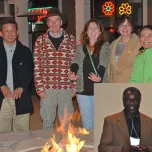(Left to Right: Izuru Sakai, Mark Hudson, Teena Clouston, Marie Anne Ben, Mami Aoyama. Inset: Moses Ikiugu)
The annual meeting of the Society for the Study of Occupation: USA (SSO: USA) was held in Park City, Utah from October 20-22, 2011. Park City is located in the Utah mountains at an altitude of over 2000m. The overall conference theme was “Mountain Top Reflections: Learning from Ten Years as a Scholarly Community”. The city is an attractive town with a rich natural environment where we came across beaver and deer.
At the conference, two sessions were held on the topic of occupational science/occupational therapy and global climate change. These two sessions were organized by Mami Aoyama of the Dept. of Occupational Therapy at the University of West Kyushu, Japan, Moses Ikiugu of the Dept. of Occupational Therapy at the University of South Dakota, and Mark Hudson, an anthropologist also in the Dept. of Occupational Therapy, University of West Kyushu. Through email and Skype discussions prior to the conference, the organizers brought together a group of 8 occupational therapists/scientists who were interested in the topic of occupation and climate change. This international and multidisciplinary group comprised of four persons from the UK, one from the USA, and three from Japan.
The first of the two sessions was titled “Thinking about Occupation like a Mountain: Connecting Occupation, Nature and Well-being”. The four speakers in this session were: Aoyama, Ikiugu, Ben Whittaker, and Tamara Rayment (Ben and Tamara are affiliated to the Centre for Sustainable Healthcare). The session focused primarily on the discussion of:
(1) Global climate change and the current state of the crisis in ecosystems and how this crisis will affect health and the economy.
(2) The importance of recognizing how occupation is related to well-being and impacts ecosystems, and the importance of promoting the choice and performance of sustainable meaningful occupations in order to resolve the crisis.
(3) The need for balance among the ecosystems, society and economy, and the significance of expanding the role of occupational therapy to include addressing the global crisis of climate change and ecosystem balance/restoration.
The second session “Sustaining Occupation: Individual Meaning and Governance in the Face of Global Environmental Change” consisted of reports and suggestions about how individuals and communities can engage with environmental problems. Teena Clouston (Dept. of Occupational Therapy, Cardiff University) examined the experience of being “too busy” that industrialization has brought about and emphasized the importance of occupational balance for the resilience and sustainability of individuals, families, communities, societies and ecosystems. Gaynor Sadlo (Dept. of Occupational Therapy, University of Brighton) spoke about how the concept of “mindfulness” “offers possibilities in our efforts to modify how we act” and thus to build sustainability. Izuru Sakai (Professor of Sociology at the University of West Kyushu) reported on local community activities relating to environmental conservation in Jōbaru Village, Kanzaki, Japan. Finally, Mark Hudson used the example of Alaska Natives to discuss the impact of globalization on environmental change and to examine contradictions in community life between meaningful occupations and conservation practices.
The presentations in both sessions were followed by lively discussions during which members of the audience complimented the discussants on the presentation of a “wonderful” program. Comments were also made about how difficulty it was to get people to change occupations that are rooted in their cultures, and are dear to them because in part they define their identities. However, along with admission of the fact that the idea of climate cultural change was challenging, there was much optimistic energy in both presentations, with many suggestions by the audience of possible strategies to create change. After the two sessions, the presenters met to discuss plans for collaborative publication and further research. These cooperative endeavors are on-going.
Ben, Tamara and Gaynor recorded their talks and participated in the discussion by Skype. Our sessions this time were a historic event for occupational science in the sense that several of the presenters took part in the session and discussions by Skype. The success of this format showed us that this is one sustainable way to develop cooperation in the future. We are grateful to Tina, Pollie and all the local organizers in Utah for their help with supporting this technology.
Report by Mami Aoyama and Moses Ikiugu
Final note by Mami: In Japan, I have not yet met any other occupational therapists who are engaged with the problems of climate change and sustainability. I was thus very happy to participate in these sessions which gave me the chance to exchange ideas with a group of like-minded individuals.

Please log in or sign up to comment.